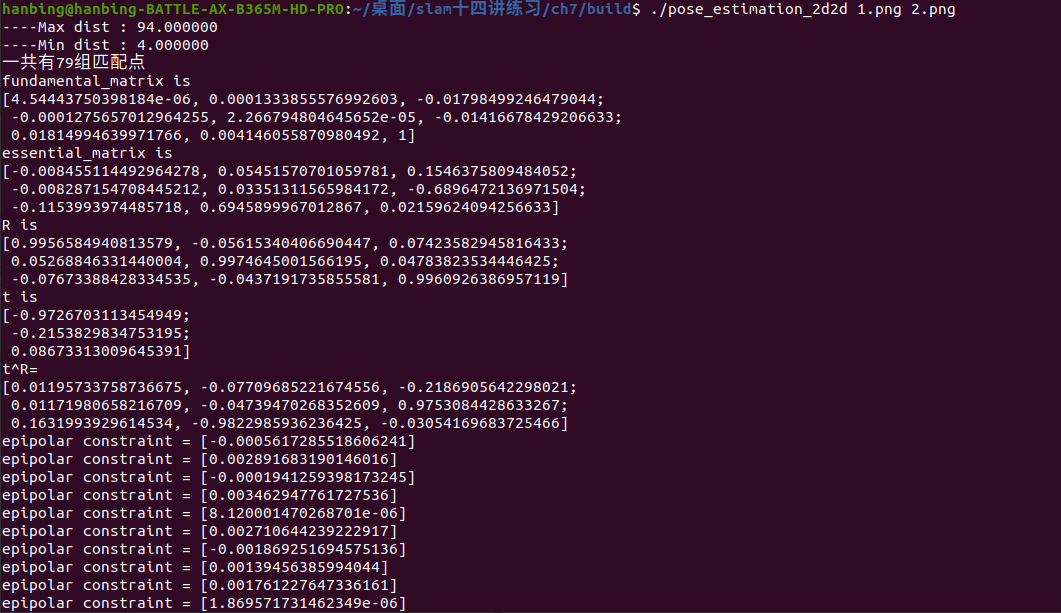我是靠谱客的博主 独特彩虹,这篇文章主要介绍slam十四讲第七讲 pose_estimation_2d2dslam十四讲第七讲 pose_estimation_2d2d,现在分享给大家,希望可以做个参考。
slam十四讲第七讲 pose_estimation_2d2d
以下均为ubuntu20.04下完成,报错的地方均以修改,希望小伙伴批评指正。另外,关于特征点匹配的详细代码在另一篇文章中,可自行查阅。
https://blog.csdn.net/weixin_51326570/article/details/112839378
#include <iostream>
#include <opencv2/core/core.hpp>
#include <opencv2/features2d/features2d.hpp>
#include <opencv2/highgui/highgui.hpp>
#include <opencv2/calib3d/calib3d.hpp>//该库用于3D信息重建,姿态估计,摄像机标定等。
using namespace std;
using namespace cv;
void find_feature_matches(
const Mat &img_1, const Mat &img_2,//&img_1 指向img_1的地址
std::vector<KeyPoint> &keypoints_1,
std::vector<KeyPoint> &keypoints_2,
std::vector<DMatch> &matches);
void pose_estimation_2d2d(
std::vector<KeyPoint> keypoints_1,//定义容器存储特征点信息
std::vector<KeyPoint> keypoints_2,
std::vector<DMatch> matches,
Mat &R, Mat &t);
Point2d pixel2cam(const Point2d &p, const Mat &k);//像素转相机坐标 只是定义一下,想要转换需要 p 和 K 两个东西。
int main(int argc, char **argv) {
if (argc != 3) { //程序自身加两张图片=3
cout << "usage: pose_estimation_2d2d img1 img2" << endl;
return 1;
}
Mat img_1 = imread(argv[1], 1);//读取图像
Mat img_2 = imread(argv[2], 1);
assert(img_1.data && img_2.data && "Can not load images!");//判断传入的是否是图像数据
vector<KeyPoint> keypoints_1, keypoints_2;
vector<DMatch> matches;
find_feature_matches(img_1, img_2, keypoints_1, keypoints_2, matches);//上面声明过用法,把匹配信息传入matches
cout << "一共有" << matches.size() << "组匹配点" << endl;
Mat R, t;
pose_estimation_2d2d(keypoints_1, keypoints_2, matches, R, t);
Mat t_x = //就是t的反对称矩阵,看看反对称形式就明白
(Mat_<double>(3, 3) << 0, -t.at<double>(2, 0), t.at<double>(1, 0),
t.at<double>(2, 0), 0, -t.at<double>(0, 0),
-t.at<double>(1, 0), t.at<double>(0, 0), 0);
cout << "t^R= " << endl << t_x * R << endl;
Mat K = (Mat_<double>(3, 3) << 520.9, 0, 325.1, 0, 521.0, 249.7, 0, 0, 1);//K为相机内参,已知
for (DMatch m: matches) {
Point2d pt1 = pixel2cam(keypoints_1[m.queryIdx].pt, K);//利用p=KPc求出相机坐标,queryIdx与trainIdx为匹配点对应的序号,pixel2cam上边定义过,此处输入 p 和 K
Mat y1 = (Mat_<double>(3, 1) << pt1.x, pt1.y, 1);//将相机坐标变成三维向量,因为是单目无深度信息,故z=1
Point2d pt2 = pixel2cam(keypoints_2[m.trainIdx].pt, K);
Mat y2 = (Mat_<double>(3, 1) << pt2.x, pt2.y, 1);
Mat d = y2.t() * t_x * R * y1;//这就是公式,看书 eg:P转至*K=y2
cout << "epipolar constraint = " << d << endl;
}
return 0;
}
//这部分内容在上一个有明确的说明,大家可以查阅,就是特征点的提取和匹配
void find_feature_matches(const Mat &img_1, const Mat &img_2,
std::vector<KeyPoint> &keypoints_1,
std::vector<KeyPoint> &keypoints_2,
std::vector<DMatch> &matches) {
Mat descriptors_1, descriptors_2;
Ptr<FeatureDetector> detector = ORB::create();
Ptr<DescriptorExtractor> descriptor = ORB::create();
Ptr<DescriptorMatcher> matcher = DescriptorMatcher::create("BruteForce-Hamming");
detector->detect(img_1, keypoints_1);
detector->detect(img_2, keypoints_2);
descriptor->compute(img_1, keypoints_1, descriptors_1);
descriptor->compute(img_2, keypoints_2, descriptors_2);
vector<DMatch> match;
matcher->match(descriptors_1, descriptors_2, match);
//找出所有匹配之间的最小距离和最大距离, 即是最相似的和最不相似的两组点之间的距离
double min_dist = 10000, max_dist = 0;//定义最大值最小值,不用纠结数字,后面会被换掉
for (int i = 0; i < descriptors_1.rows; i++) {
double dist = match[i].distance; //遍历每一对匹配点,找出最大距离和最小距离 作为后面筛选点的标准
if (dist < min_dist) min_dist = dist;
if (dist > max_dist) max_dist = dist;
}
printf("----Max dist : %f n", max_dist);
printf("----Min dist : %f n", min_dist);
for (int i = 0; i < descriptors_1.rows; i++) {
if (match[i].distance <= max(2 * min_dist, 30.0)) { //当描述子之间的距离大于两倍的最小距离时,即认为匹配有误.但有时候最小距离会非常小,设置一个经验值30作为下限.
matches.push_back(match[i]);
}
}
}
Point2d pixel2cam(const Point2d &p, const Mat &K) { //像素点转化相机坐标的公式,自己定义上面在调用,哈哈开始我也以为是自动转的,具体做法就是k求个逆矩阵,一看就出来了,是在看不懂就评论区留言就好。
return Point2d
(
(p.x - K.at<double>(0, 2)) / K.at<double>(0, 0),
(p.y - K.at<double>(1, 2)) / K.at<double>(1, 1)
);
}
void pose_estimation_2d2d(std::vector<KeyPoint> keypoints_1,
std::vector<KeyPoint> keypoints_2,
std::vector<DMatch> matches,
Mat &R, Mat &t) {
Mat K = (Mat_<double>(3, 3) << 520.9, 0, 325.1, 0, 521.0, 249.7, 0, 0, 1);//相机内参
vector<Point2f> points1;//用来存储像素坐标的
vector<Point2f> points2;
for (int i = 0; i < (int)matches.size(); i++) {
points1.push_back(keypoints_1[matches[i].queryIdx].pt);//像素信息存入points1
points2.push_back(keypoints_2[matches[i].trainIdx].pt);
}
Mat fundamental_matrix;//计算基础矩阵
fundamental_matrix = findFundamentalMat(points1, points2, FM_8POINT);//系统给你算,输入两个像素点就好。FM_8POINT这个地方改动了,要注意,不同版本的形式可能不同。
cout << "fundamental_matrix is " << endl <<fundamental_matrix << endl;
Point2d principal_point(325.1, 249.7);//相机光心,TUM dataset标定值
double focal_length = 521;//相机焦据 f,TUM dataset标定值
Mat essential_matrix;//系统给你算,输入像素点,相机光心,焦距就好
essential_matrix = findEssentialMat(points1, points2, focal_length, principal_point);
cout << "essential_matrix is " << endl << essential_matrix << endl;
recoverPose(essential_matrix, points1, points2, R, t, focal_length, principal_point);//同理,不说了
cout << "R is" << endl << R << endl;
cout << "t is" << endl << t << endl;
}
以下为运行结果

最后
以上就是独特彩虹最近收集整理的关于slam十四讲第七讲 pose_estimation_2d2dslam十四讲第七讲 pose_estimation_2d2d的全部内容,更多相关slam十四讲第七讲内容请搜索靠谱客的其他文章。
本图文内容来源于网友提供,作为学习参考使用,或来自网络收集整理,版权属于原作者所有。



![[技术分享] 用Python玩转3D人体姿态估计导语](https://file2.kaopuke.com:8081/files_image/reation/bcimg9.png)




发表评论 取消回复